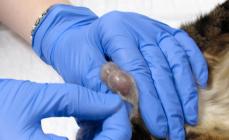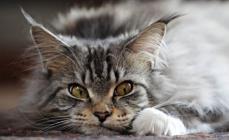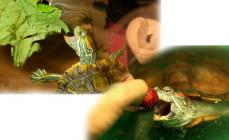Are you choosing a kitten? Then remember that when choosing, you need to pay attention not only to the breed, but also to the color of the animal: according to research by German scientists, it is the color that will largely determine the character of your pet and its basic habits. The color of a kitten's coat helps to classify cats into several typical groups, and knowing this, the color of your pet's coat can tell you at a glance what he will be like when you bring him home.
White - timid, affectionate Golden - calm, love to be brushed Red - smart, playful Color-point (Siamese) - sociable, very attached to the owner
Striped - inventive, mischievous
Gray - independent, freedom-loving
Blue - sociable, friendly
Marble - flirtatious, flexible
Chocolate - demanding, cheerful
Smoky - phlegmatic, judicious
Tortoiseshell - loyal, mischievous
Black - kind, obedient It is believed that black kittens are the most obedient, reverent and sweet.
For a long time, black cats were perceived as bringing bad luck, and centuries of hostility have taught these animals to be very sensitive and affectionate. Such a kitten will always be sociable and will easily become attached to you if he feels sincere sympathy, and will also easily find contact with the child. At the same time, by the way, it is believed that the most affectionate and accommodating are black cats, not cats. They are the ones who make contact more often and delight their owners with unconditional obedience. However, if you are too strict with your pet, he will very quickly become nervous and withdrawn and will be afraid to do something so as not to anger you. Therefore, try not to upset the baby in vain. Moreover, to this day, in many countries of the world, the black and white cat is considered a helper to everyone who experiences heavy blows of fate, because only she helps to endure them more steadfastly. So black cats have always enjoyed great respect in the world, and today this respect is only growing stronger day by day. Black cats bring not only happiness and good luck, but also peace of mind. Black cats are medicinal animals. The owner, as a rule, is a dreamy, self-absorbed romantic. Gray kittens are good not only for the unusual color of their amazing skin, but also for their extraordinary abilities.
It is believed that color can influence the character and endow a cat with a lot of hidden qualities, and in this regard, gray animals are considered no less popular than magical black cats. In particular, popular beliefs claim that cats of even the most ordinary gray color are able to give their owner internal and external beauty and harmony. They are also considered the best guards of the house from the brownie, and a dream with a gray cat is a warning to the sleeper that he is in danger of some kind of trouble or even danger. At the same time, as the dream book testifies, a gray cat is not always a symbol of these troubles; it only helps to prepare for them and overcome them with dignity. Gray cats are also believed to have healing powers. For example, they can contribute to the normal course of pregnancy in women, and gray-greenish cats even know how to treat their owners at night, supposedly using lunar energy for this. As a rule, all gray cats have a reputation for being very strong and at the same time docile and phlegmatic animals. They are distinguished by their even and gentle character, as well as their remarkable intelligence and true devotion to their owner. In addition, it is believed that a cat with gray eyes is always very affectionate and generous and does not have a typically “cat” vindictive character.
The smartest ones, undoubtedly, are red kittens (it is no coincidence that these are the ones that scientists select to study the nervous activity of animals or for training). Animals with this coat color will be able to get used to your requirements from the very first day and will obey you. However, do not be surprised if it turns out that their obedience is just a cunning plan, and in fact the pet is simply trying to get something from you in this way. This desire for naive deceit can, over time, even turn a kitten into a little impudent one, but still rest assured: you will never get outright hooliganism from a ginger kitten! Even if this kid does mischief, it will be only to have fun, or, even more likely, to entertain you: red cats feel very well when you are sad, and will gladly come to support you and make you laugh. It is believed that red cats in the house are for the well-being of the owner. Their owner is an energetic, independent person.
A pure white kitten is magic! Not only modern happy owners of such animals think so - even our ancestors were sure of this. Already in Ancient Egypt, white cats were especially revered, believing that they best help people whose lives are associated with risk and heavy physical activity. In addition, at different times, white cats were considered the personification of purity (both physical and purity of thoughts) and purity. As for external features, white cats are an example of the purest colors that have been respected and admired at all times. According to the standards, the fur of such cats should not have any impurities or shades of color, as well as inclusions and spots, although kittens can have markings of any color on the head, since such spots disappear over time. A special place among snow-white cats is occupied by white cats with blue eyes: they are considered to be a deaf breed. Indeed, such animals are most often distinguished by a timid character, since they have hearing impairment. However, this does not always mean complete deafness. In addition, scientists have proven that only 5% of white cats are actually born deaf, while the rest can hear their owners quite well. Also among white cats there are also albinos - this is a white cat whose fur has become snow-white due to the lack of pigmentation. As a rule, such cats are also distinguished by reddish eyes. It is believed that white cats bring happiness to their owners. And in England they are considered medicinal cats. A white cat represents peace in the house! The owner of the “blondes” is a neat, pedantic person who cares about the beauty and harmony of his surroundings.
Striped (patterned) - Secretive, reserved, independent and very self-sufficient. Their owner is endowed with the same characteristics and, in addition, is usually a person of a creative mind.
Bicolors (two-color) - Sociable, attached to their owner, easy contact with other pets, love children. Their owner is a friendly person with a subtle sense of humor. Tricks of colors However, the color of your future kitten is far from the only sign by which you can determine the character of your pet. Whatever one may say, basic habits also largely depend on upbringing, and if you devote enough time to your pet, he will never be capricious in vain.
And one more nuance: in two- and three-color cats, the characters depend on the predominance of colors in their color, but it is believed that two-color kittens are more playful and cheerful, while three-colored ones are flexible and devoted to their owners. So if you don’t want one color to be the main color of your kitten, choose a motley pet and you won’t go wrong! However, even if you buy the most difficult kitten, don’t be upset: he will still give you a lot of pleasant moments and will be the favorite of your whole family, who will love him not at all for his color features! 
Scientists have long come to the conclusion that cats are “magnets” of negative energy. By taking it, animals treat their owners and help get rid of diseases. It’s not for nothing that cats usually lie down on the place that hurts. But at the same time, cats are the most capricious animals.
What cat breeds are suitable for choleric people?
Active people, those who don’t like to sit still, will benefit from an animal that is similar in temperament to them. Vigor and activity should be in their blood. A pet lying on the sofa for days will only irritate the owner. Even if the future owner likes such a cat with a beautiful face, he will soon become completely indifferent to him. But, for example, a warlike Burmese cat will initially compete with a person for the right to be the head of the house, but later a close partnership will be established between the owner and the pet - food and games in exchange for positive emotions and energy. Siamese beauties or gloomy orientals are also suitable for energetic people.
Cats for melancholic people
People prone to depression, those who are often in a depressed mood, need a cat that will share energy with them, but not dominate the owner. Otherwise, a person simply will not cope with his pet. “Native” cats will help you get rid of stress. It could be a Siberian, a bobtail or a magnificent Maine Coon. A luxurious Persian would also be suitable - frequent stroking of his fur relieves stress. The fashionable British will also be happy to get rid of a bad mood.
Bengals are a source of inspiration for phlegmatic personalities
Unusual breeds are suitable for creative people. If you want to find a “delicate” and sophisticated cat, get a Sphynx. Bengals or Abyssinians will help you find suddenly missing inspiration. Blue-eyed ragdolls will never cease to amaze you. A Cornish or Devon Rex can show how interesting a friend a cat will be for you.
Those who like to spend evenings alone and avoid communicating with people should get themselves a cat - a friend. He will lie on your lap, calm you down with his purring and help you take a break from the external bustle. Scots, both folds and straights, shy exotics, and even Persians, mainly chinchilla in color, are also suitable. But whatever your character, inclinations and mood, remember, where your cat lives is your home. Assess the situation correctly and do not forget to press the buttons and
25.07.2015 09:30
Melt water has been used in folk medicine for a very long time. It is relatively easy to obtain; for this...
As you know, cats can heal. They are able to find a problem area on the human body and heal...
“The main thing in life is to decide: where is your place and what kind of bird are you?” - this was the song they sang in one old Soviet cartoon. There is a rational grain in this - when choosing a kitten, you will have to decide on several parameters at once. The presence of pedigree, degree of fluffiness, gender, breed and age - everything matters. Let's try to figure it out.
Determining the pedigree
First you need to understand why you are adopting a kitten. If you are attracted to collecting medals that your pet has deservedly received at various exhibitions, then, of course, the choice should fall on the “nobleman”. When purchasing, be careful: the kitten must be registered in a certain cat club and have a confirmed pedigree, as well as a number of other documents and certificates that indicate information about its ancestors (primarily their breed, color, participation in exhibitions). The more generations of ancestors listed in the pedigree, the better. However, if you are looking for a kitten solely for living together for mutual pleasure, then the degree of birth does not matter at all.
Gender, size, age and degree of fluffiness
Which gender should you choose for your future kitten? It's difficult to give any recommendations here. Cats are more independent and independent, but they regularly mark their territory and are ready to constantly sort things out with neighboring cats, and even with you, on occasion. Cats are more gentle and affectionate, but from time to time they are going to give birth and communicate their desire by screaming. A very loud scream. In general, it’s like with children: who do you want more - a boy or a girl?
Size. When deciding on the size of a kitten, it is best to adhere to the principle of the golden mean. The largest kitten in the litter is most likely not only the healthiest, but also the most selfish, because it pushed away its siblings and received more milk from its mother. It is possible that such a kitten will show aggression in the future. Accordingly, the smallest kitten is most likely the weakest, since it was unable to stand up for itself.
However, all these are special cases and are not the rule. The main thing is that the kitten is not fearful or distrustful, does not show aggressiveness and makes contact easily.
Now about age - how to choose a kitten by age. Most clubs adhere to this rule - a kitten must be given away at three months of age. This approach is justified: up to this age, the kitten still requires special care, and by three months the mother cat has already managed to pass on the necessary knowledge and skills to her babies, such as the ability to wash themselves, hunt and behave in society. In addition, by the age of three months, the kitten can already learn to use the litter tray and will not make puddles in every corner.
Another important point is that at three months the kitten ceases to be a cute fluffy ball, and you can more accurately determine its future appearance.
The last aspect that I would like to focus on is that a small kitten is exposed to a huge number of dangers - viruses and infections, other pets, small children who do not yet know how to balance their strength...
In general, if you have any choice, it is better to choose a three-month-old kitten or older.
As for the length of the fur, the choice depends solely on the availability of free time - a long-haired cat requires more attention to its person, because long hair needs to be combed several times a day, and the apartment will have to be cleaned more often. With short-haired pets everything is somewhat simpler, but in general, of course, you need to focus on your taste.
How to determine a kitten's character?
Choosing a kitten is a strictly individual matter; everyone can rely only on their own taste and preferences. There are no specific instructions, but we will try to give general recommendations.
It is best to choose a kitten that is active and curious - this behavior is typical for any baby, and kittens are no exception. However, pay attention - despite the activity and jumping ability, the kitten must be calm: it should not be scared, nervous or aggressive. When you first meet a kitten, try picking him up - if he shows trust and curiosity, tries to sniff your hand, doesn’t cry or tries to hide in a corner, then everything is fine. Such a kitten makes easy contact and is quite possible to get along with - an ideal pet. It is much worse if the kitten backs away, hisses and tries to hide behind its mother at the first meeting - most likely, it will grow up cowardly and distrustful. However, this can be completely treated with affection and care. But if a kitten tried to bite you, this indicates aggression: such a pet needs a special approach - you will have to be firm and strict, otherwise you and your guests will be constantly attacked.
Kitten and health
The kitten must be healthy - perhaps this is obvious. Well, if so, before purchasing you will have to examine the baby properly. Ideally, of course, immediately take a veterinarian you know with you - let him advise you, but not every person has such a powerful resource as a familiar veterinarian! If you don’t know a doctor, you can simply request a veterinary certificate for the kitten, or still take a risk and trust your intuition. But in any case, a few tips will not hurt you:
Step one - superficial inspection
The first impression of a kitten’s health can be made simply by observing its behavior. A sad kitten who sits sadly in the corner for too long and does not respond to toys is most likely not feeling well. Refusal to play and hunt is not typical: a healthy baby constantly runs and jumps, he is very curious and sticks his nose into everything. Another indicator of well-being is the tail: in healthy kittens it is constantly raised up.
Step two - inspect the muzzle
If the eyes are watery or inflamed, the kitten is definitely sick. If a kitten sneezes regularly and fluid comes out of the nose, these are symptoms of a runny nose - everything is the same as in humans.
Look in your kitten's ear: brown discharge may indicate the presence of ear mites. If a kitten keeps its head tilted, often tries to scratch its ear and cries, it may have an ear infection - otitis media.
The kitten's mouth should be clean and healthy in appearance - any inflammation, swelling, red spots or sores indicate a serious viral infection.
Step three - evaluate the skin
Any rashes or redness on the skin, bald spots on the skin, uneven fur are sure signs of ringworm or other fungus. Taking in a kitten with such symptoms is very dangerous: infections can be transmitted to people. If your kitten is constantly itching, it is possible that he has fleas.

Which breed should I choose?
One of the most common questions that arises when choosing a kitten is choosing its breed. Here it should be remembered that all cats are great individuals and their character and behavior largely depend on the upbringing they received, the character of the owners and the general moral climate in the house. However, some general recommendations can still be given.
If you are rarely at home and are not able to devote a lot of time to your cat, then you need to choose a breed whose representatives can easily tolerate loneliness and can spend a day or two in their own company. The best choice for you will be breeds with a calm and reserved character: British, Scottish Fold, American Wirecat, Russian Blue, May Coon, Manx or Exotic.
If there are small children living in the house, then you need to choose a kitten that can keep them company in fun and games and at the same time react normally to children's spontaneity and inquisitiveness. Active but calm Egyptian cats, Burmese cats, Japanese Bobtails, Turkish Vans, Norwegian Forest cats, Sphynx cats or Abyssinian cats are good choices here.
If you prefer to spend your free time at home, are ready to devote a lot of effort to your pet and are not afraid of the prospect of constant care and care for your pet, then the best choice for you will be patient, phlegmatic and reserved cats - Siamese, Persian, Angora.
Let us remind you once again that the list is very conditional, and the most important thing for you is your psychological compatibility with your pet and its health.
Price issue
When choosing a kitten, its cost plays an important role. Everything is very complicated here - the price will depend on the specific breed, the reputation of the breeder, pedigree, the city of residence of the kitten and a dozen other factors. In general, a number of obvious patterns can be noted:
If you buy a kitten with a good pedigree from direct breeders for breeding and exhibition activities, the price will be quite high;
Just a purebred kitten, without a centuries-old pedigree, will cost much less and is quite affordable for most people;
The cheapest kittens will be the most ordinary kittens, not too purebred and without any pedigree at all.
But there is a nuance here - we adopt a pet out of love, and love is not measured by money!
Guys, we put our soul into the site. Thank you for that
that you are discovering this beauty. Thanks for the inspiration and the goosebumps.
Join us on Facebook And In contact with
There are a huge variety of cat breeds, and each has its own temperament and unique features. Just like people. Felinologists claim that we choose pets for a reason, but according to certain patterns.
We are in website found out how the choice of a cat and the character traits of its owner are connected.
1. Siamese cats
Cat character: communicative. Siamese get bored when alone and need constant attention from their owners. Cats are affectionate and noisy.
Owner's character: freedom-loving. Siamese lovers do not like to depend on anyone; they like to be independent in everything. They respect both pleasant company and loneliness. They are smart, have refined taste and a broad outlook. But they tend to keep grudges in their souls for a long time. True, if the situation requires it, they can give up their principles and go for reconciliation.
2. British
Cat character: balanced. The Briton is moderately active, moderately calm, behaves quietly and does not bother. He is friendly to children as well as other animals in the house.
Owner's character: calm. Owners of British cats, like the pets themselves, are balanced. They often communicate with other people according to their own rules: not letting them get too close, but making the most of the interaction. Good conversationalists, tactful, can be reliable friends. They are interested in many people and know how to conduct a conversation on almost any topic.
3. Sphinxes
Cat character: devoted. They look straight into the eyes of their owner, love tactile contact and strive to climb into the lap of a reliable and warm person.
Owner's character: extraordinary. Sphynx owners love to shock, they are smart, and have a sense of taste. They love tactile sensations; the leading language of understanding the world is touch. Not aggressive at all.
4. Abyssinian cats
Cat character: curious. They love to run and play and fearlessly move around their home. These cats are universal: they are suitable for both a single person and a large family.
Owner's character: extravagant. They are against the mainstream and like to do things their own way. They are kind, balanced, open, gentle, and fit in and become part of any team. Often they make a choice once and for all.
5. Persians
Cat character: calm. They impressively study the world around them. They become strongly attached to their owner. They are not inclined to do mischief.
Owner's character: phlegmatic. Persian lovers cannot stand loneliness; they need an object that will give them affection, warmth and care. They are ready to reciprocate, but due to shyness they reveal themselves only to those they trust. Homebodies, they like to create comfort. Not vindictive at all.
6. Scottish Fold cats
Cat character: modest. They are good-natured, unobtrusive, sensitive and meek. Very trusting, they get along well with both people and other pets.
Owner's character: artistic. Such cats are usually chosen by their opposites - creative, bright, unconventional people.
7. Russian blue cats
Cat character: optimistic. They are friendly, undemanding, calm. They are similar in character to the British.
Owner's character: enterprising. Lovers of these cats are prudent, often successful in business, and always have money. They are calm and cool-headed, able to impartially assess the situation and find a solution to any issue. Relationships are approached from the point of view of potential benefits - both in material terms and in the form of impressions and emotions.
8. Exotics
Cat character: friendly. They allow children to play with themselves, are easy to educate, and are clean.
Owner's character: stress-resistant. Exotic cat lovers are big kids: cheerful, open and active. They are always in the center of a noisy company and are aware of the latest innovations in the field of entertainment. They easily find a way out of difficult situations. They are not inclined to become strongly attached to someone or something; they can quickly and easily change jobs, surroundings and place of residence. But love can be carried throughout life.
9. Siberian cats
Cat character: thorough. They are calm, respect their owner, but demand respect in return. Sometimes they are hard to touch.
Owner's character: peace-loving. Most often, such cats are chosen by nature lovers, tourists, and travelers.
It is generally accepted that a kitten’s character is formed in the first twelve weeks of its life under the influence of many factors (genetic background, upbringing of the mother cat, attitude of the people around him towards the small animal, living conditions, and so on).
To determine the character of a kitten that will become your friend for the rest of its life, you can resort to the following testing methods.
Meeting the kitten.
Observe how he reacts to a stranger, that is, to you. Take his attention away from his brothers and sisters and evaluate his level of interest in you and how he behaves in your arms (feels calm or tries to run away).
The personality of a kitten.
Try to discern the individuality in the kitten. We are not talking about external signs - the original color and protruding mustache - but about character traits. What kind of kitten do you like: friendly, brave, shy, playful, or maybe nervous and restless?
Take your time when choosing a kitten.
Don't rush to choose. By purchasing the first kitten you come across, you also risk hastily abandoning it soon due to a mismatch of characters. And it's not a joke. You need to be very picky when choosing a four-legged friend.
Play with the kitten.
Before meeting a potential four-legged friend, it won’t hurt to acquire special “tools” for testing kittens. These are ordinary improvised materials. For example, you can use a feather or ribbon to test your kitten's playfulness and curiosity. Just tease your baby with a feather and watch his reaction. A healthy and energetic kitten will definitely be interested in a strange toy.
Breed and character of the kitten.
Breed also has a certain influence on the temperament and character of a tiny four-legged creature. For example, kittens are distinguished by their unique devotion to humans, but at the same time they have a difficult character. Temperament, activity, energy, and sometimes even vindictiveness and aggressiveness are common features of the Siamese-Oriental group of cats. Handsome men have an absolutely opposite character. Their highlight is considered to be their innate softness and phlegmatic nature. Many people have a peaceful and intelligent disposition, as well as a special imposing attitude. Cats are also patient, sociable and affectionate. — a little timid and often shy away from strangers. The hairless cat breed is a cat-dog by nature; almost all owners speak of its boundless devotion and affection.
But the Reed Cat cannot boast of an impeccable reputation. This large and rare breed of cats can only conditionally be classified as domestic animals. To date, significant changes have affected only the appearance of these animals, but breeders will still have to work hard on the character of these wild beauties, and not everyone can afford such exotica.
All the best, see you again friends!
If the post was useful to you,
please share on your social network.
Click on the buttons below the article.
You don't care, but I'm pleased.
Sincerely, blog author Marina.






